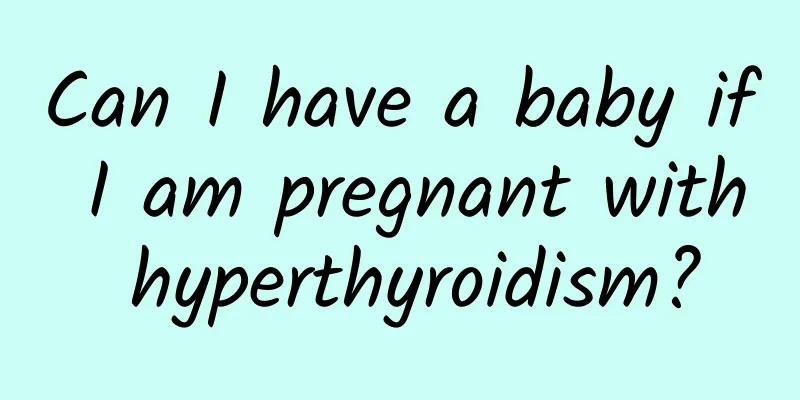Can I have a baby if I am pregnant with hyperthyroidism?

|
Hyperthyroidism requires adequate carbohydrates and fats. Carbohydrates and fats have the effect of saving protein. If they are adequately supplied, they can make their proteins play their unique physiological functions. Provide sufficient vitamins and inorganic salts. Vitamins and mineral salts can regulate physiological functions and improve body metabolism, especially vitamins and vitamin C. Adequate potassium and iron should be given to prevent deficiency. 1. Hyperthyroidism complicated by pregnancy Hyperthyroidism often occurs in women of childbearing age, so we often encounter patients with hyperthyroidism and pregnancy in clinical practice. Since antithyroid drugs have teratogenic effects on the fetus, it is necessary to discuss with the doctor based on the condition of the patient to decide whether to keep or abandon the fetus. Pregnant hyperthyroidism patients are contraindicated for radioactive iodine treatment. Most hyperthyroidism patients who need to continue their pregnancy are treated with medication, and the minimum effective dose should be used as much as possible. Thyroid hormones should not be added simultaneously during treatment. Free T4 (FT4), free T3 (FT3) and TSH, rather than total T4 and total T3, need to be measured every 1 to 3 months. During treatment, free T4 needs to be maintained at the upper limit of normal values. 2. Thyroid-related eye disease Most cases of hyperthyroidism are Gravs' disease, which is an organ autoimmune disease. Organ autoimmune diseases are often combined with other organ autoimmune diseases. Hyperthyroidism patients often have exophthalmos, which is an organ autoimmune disease of the orbit (including the extraocular muscles and retroocular fat). Clinically, in addition to Graves' disease patients, some other thyroid autoimmune diseases, such as chronic lymphocytic thyroiditis, can also present with exophthalmos, so we call it "thyroid-related eye disease." There is no direct relationship between thyroid-related eye disease and Graves' disease. They are not a "father and son" relationship, but a "brother" relationship. Satisfactory control of hyperthyroidism is helpful for eye disease, but it does not necessarily improve. treat There are three methods for treating hyperthyroidism: antithyroid drug therapy, radioactive iodine therapy and surgical treatment. Antithyroid drug treatment has a wide range of applications. It can be used to treat adults and children, men and women, mild or severe hyperthyroidism, first-time attack or recurrence of hyperthyroidism, and pregnant or breastfeeding women with hyperthyroidism. There are two types of antithyroid drugs - imidazoles and thiouracils. The representative drugs are methimazole (also known as "thimazole") and propylthiouracil (also known as "propylthiouracil"). Drug treatment is suitable for pregnant women with hyperthyroidism, children, and patients with mildly enlarged thyroid gland. Treatment generally takes 1 to 2 years, and the drug dosage needs to be increased or decreased during treatment according to the thyroid function. Drug treatment has some side effects, including granulocytopenia, drug allergy, impaired liver function, joint pain and vasculitis. The side effects of drugs need to be closely monitored in the early stage of drug treatment, especially granulocytopenia. Patients need to be warned that if they have fever and/or sore throat, they need to check their granulocytes immediately to determine whether granulocytopenia occurs. Once it occurs. Immediately discontinue emergency medication. Another disadvantage of drug treatment is the high relapse rate after discontinuation of medication, which is about 50%. Both radioactive iodine therapy and surgical treatment are destructive treatments. Hyperthyroidism is not likely to recur and treatment only requires one time. Radioactive iodine is suitable for patients with moderate thyroid enlargement or recurrence of hyperthyroidism. Doctors calculate the radiation dose required for each patient based on the patient's thyroid gland's uptake rate of radioactive iodine. Radioactive iodine is absolutely contraindicated in pregnant and lactating women. Because radioactive iodine has a delayed effect, the incidence of hypothyroidism is 3% to 5% per year over time. Radioactive iodine therapy is not suitable for hyperthyroid patients with thyroid eye disease because the eye disease may worsen after treatment. |
<<: What is the best food for patients with hyperthyroidism?
>>: Can patients with hyperthyroidism eat bayberry?
Recommend
What to drink with Gardenia
Gardenia is a common flower in our daily life. It...
Can tuberculosis be completely cured?
Tuberculosis is a common respiratory infectious d...
Is back pain caused by kidney deficiency? Do you understand now?
Nowadays, kidney deficiency is no longer a diseas...
What to do if your feet smell? What methods can be used to remove foot odor?
Smelly feet bother many people and make them feel...
How to correct the bend in the calf
It is quite common in life to have slightly bent ...
What are the treatments for acute leukemia?
The treatment of acute leukemia, including suppor...
What are the side effects of fish oil? What should I pay attention to?
Fish oil is a common health product in life. It i...
How to exercise waist muscles effectively
The main purpose of exercising the waist muscles ...
If you have these five symptoms in your body, be careful that it is heat toxins that are coming to you.
Heat toxicity is a disease in traditional Chinese...
How to eat lotus seeds
Lotus seeds, also known as white lotus, are a pla...
Is superficial vein thrombosis dangerous?
Superficial vein thrombosis is also relatively co...
What to do if the fracture does not heal
The phenomenon of non-union of fractures causes g...
The magical effects and functions of leeches
Leeches are a kind of Chinese herbal medicine wit...
How to sleep better when you are 6 months pregnant? What are the health care common sense?
Generally speaking, when the pregnancy reaches ab...
What to eat for liver detoxification
The liver is the most important metabolic organ i...









